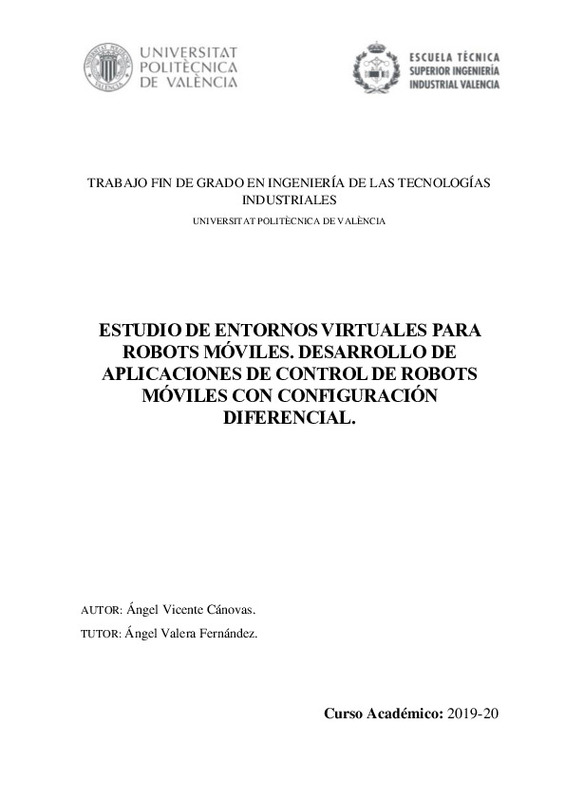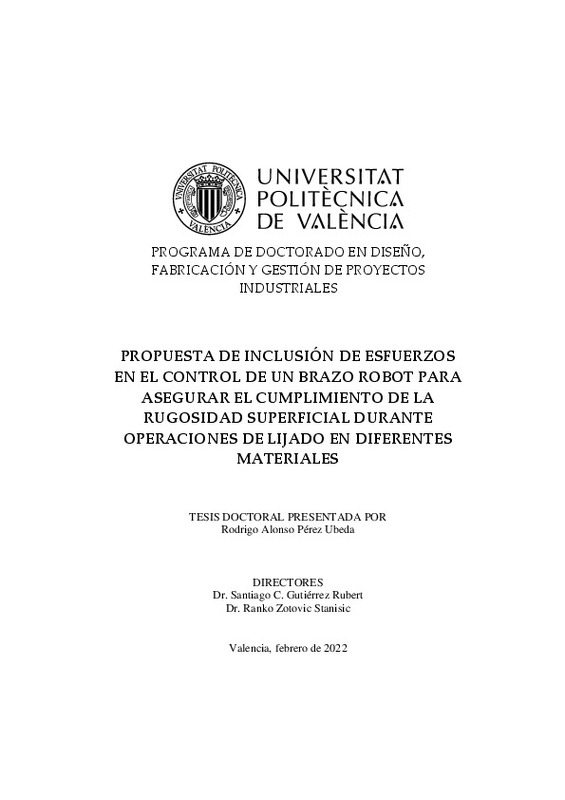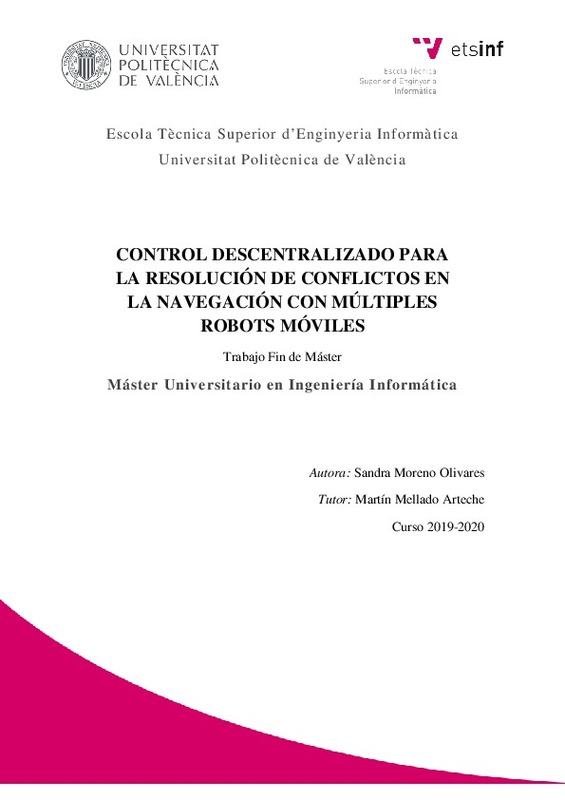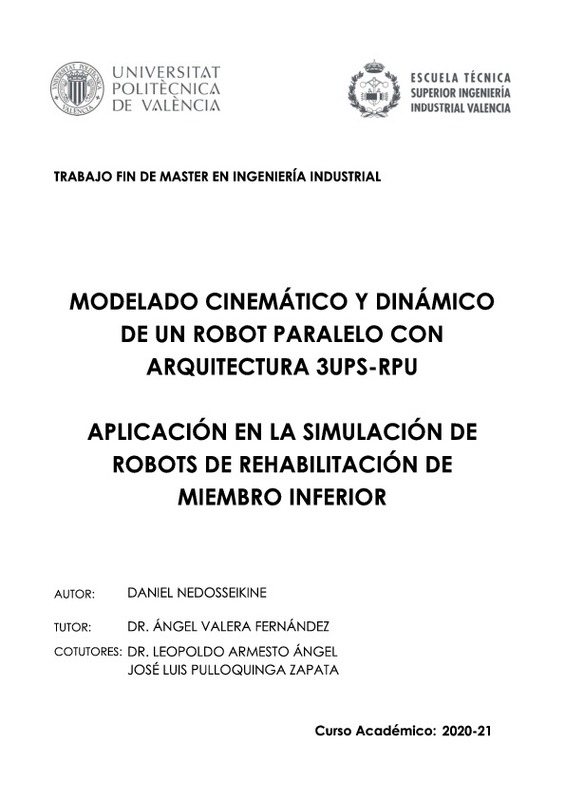JavaScript is disabled for your browser. Some features of this site may not work without it.
Buscar en RiuNet
Listar
Mi cuenta
Estadísticas
Ayuda RiuNet
Admin. UPV
Estudio de entornos virtuales para robots móviles. Desarrollo de aplicaciones de control de robots móviles con configuración diferencial
Mostrar el registro sencillo del ítem
Ficheros en el ítem
| dc.contributor.advisor | Valera Fernández, Ángel
|
es_ES |
| dc.contributor.author | Vicente Cánovas, Ángel
|
es_ES |
| dc.date.accessioned | 2021-01-28T13:00:27Z | |
| dc.date.available | 2021-01-28T13:00:27Z | |
| dc.date.created | 2020-09-10 | |
| dc.date.issued | 2021-01-28 | es_ES |
| dc.identifier.uri | http://hdl.handle.net/10251/160188 | |
| dc.description.abstract | [ES] Motivado por lo que se conoce como Industria 4.0, recientemente el control de robots manipuladores y móviles es un área de interés para investigadores y desarrolladores industriales. La robótica va a detonar un importante avance científico y tecnológico en diversas áreas de la mecánica, control, electrónica, computación, salud y seguridad, entre otros (1). Por todo ello, no es de extrañar que sea una de las asignaturas más importantes y comunes en Ingeniería. En el presente Trabajo Fin de Grado (TFG) se proponía trabajar en esta área, en concreto con el desarrollo de aplicaciones relacionadas con la navegación de robots móviles y el desarrollo de misiones con dichos sistemas. En este TFG se pretendía utilizar el Lego Mindstorms EV3, el robot móvil real disponible en el Laboratorio de Robótica del Dpto. de Ingeniería de Sistemas y Automática de la Universitat Politècnica de València. De hecho, se empezó a trabajar y se pudieron obtener ejecuciones reales con los robots físicos. Sin embargo, por los problemas provocados por la pandemia relacionada con el COVID-19, se tuvo que cambiar el enfoque el trabajo, por lo que se estuvieron estudiando diversas soluciones para poder trabajar con robots simulados. Así, se propone analizar y utilizar dos herramientas para trabajar con robots virtuales: la herramienta Robot Virtual Worlds, simulador original de RobotC, la plataforma usada en las prácticas de la asignatura de Laboratorio de Automatización y Control en el grado; y CoppeliaSim como segunda opción. De esta forma, se trabajará con estas dos herramientas, explicando su funcionamiento y modo de empleo, estudiándose las características básicas y las ventajas e inconvenientes de ellas, comparándolas y desarrollándose diversas tareas de programación de robot móviles en ambos entornos como ejemplo, una de control cinemático de los robots móviles diferenciales y otra aplicación utilizando sensores. Además, se estudia LeoCAD como posible solución fácil al modelado del robot. Así daríamos una oportunidad para continuar trabajos de robótica en casa o a distancia y no volver a tener este problema | es_ES |
| dc.description.abstract | [EN] Motivated by the Industry 4.0, the control of robot manipulators and mobile robots has recently become an area of interest for industrial researchers and developers. According to several magazines, we can define robotics as a science that bring together various technological branches or disciplines, with the aim of designing robotic machines capable of performing automated tasks or simulating human or animal behaviours (1). For these reasons, it is not surprising that robotics is one of the most important and common subjects in engineering. This subject area is the purpose of this TFG, specifically the development of applications related to the navigation of mobile robots and the development of missions with these systems. This project intended to use the Lego Mindstorms EV3, the real mobile robots available in the Robotics Laboratory of the Department of Systems and Automatic Engineering of the Polytechnic University of Valencia. In fact, work began and real executions with physical robots were successfully achieved. However, due to the problems caused by the pandemic COVID-19, the focus of the work changed. Therefore, many solutions have been studied in order to work with simulated robots. Consequently, analysing and using two tools to work with virtual robots has been proposed: Robot Virtual Worlds, environment developed by RobotC, which is the current platform used in the subject of Laboratory of Automatic and Control; and CoppeliaSim as second option. Therefore, the TFG will work with these two tools, explaining their functions and method of use, studying the basic characteristics and the advantages of them, and developing various mobile robot control task in both environments, one of them is related to the kinematic control of mobile robots with differential configuration, and other application where sensors are used. In addition, LeoCAD is studied as possible solution to model the robot. This, an opportunity to continue robotic works at home is given to you. | es_ES |
| dc.format.extent | 103 | es_ES |
| dc.language | Español | es_ES |
| dc.publisher | Universitat Politècnica de València | es_ES |
| dc.rights | Reserva de todos los derechos | es_ES |
| dc.subject | Control por computador | es_ES |
| dc.subject | Control de robots | es_ES |
| dc.subject | Robótica móvil | es_ES |
| dc.subject | Navegación automática | es_ES |
| dc.subject | Control cinemático | es_ES |
| dc.subject | Robótica | es_ES |
| dc.subject | Simulación | es_ES |
| dc.subject | MATLAB | es_ES |
| dc.subject | Lego Mindstorms EV3 | es_ES |
| dc.subject | CoppeliaSim | es_ES |
| dc.subject | Robot Virtual Worlds | es_ES |
| dc.subject | RobotC | es_ES |
| dc.subject | Computer control | es_ES |
| dc.subject | Robot control | es_ES |
| dc.subject | Mobile robotics | es_ES |
| dc.subject | Automatic navigation | es_ES |
| dc.subject | Kinematic control | es_ES |
| dc.subject | Robotics | es_ES |
| dc.subject | Simulation | es_ES |
| dc.subject | Robot Virtual Worlds | es_ES |
| dc.subject | RobotC. | es_ES |
| dc.subject.classification | INGENIERIA DE SISTEMAS Y AUTOMATICA | es_ES |
| dc.subject.other | Grado en Ingeniería en Tecnologías Industriales-Grau en Enginyeria en Tecnologies Industrials | es_ES |
| dc.title | Estudio de entornos virtuales para robots móviles. Desarrollo de aplicaciones de control de robots móviles con configuración diferencial | es_ES |
| dc.type | Proyecto/Trabajo fin de carrera/grado | es_ES |
| dc.rights.accessRights | Abierto | es_ES |
| dc.contributor.affiliation | Universitat Politècnica de València. Departamento de Ingeniería de Sistemas y Automática - Departament d'Enginyeria de Sistemes i Automàtica | es_ES |
| dc.contributor.affiliation | Universitat Politècnica de València. Escuela Técnica Superior de Ingenieros Industriales - Escola Tècnica Superior d'Enginyers Industrials | es_ES |
| dc.description.bibliographicCitation | Vicente Cánovas, Á. (2020). Estudio de entornos virtuales para robots móviles. Desarrollo de aplicaciones de control de robots móviles con configuración diferencial. Universitat Politècnica de València. http://hdl.handle.net/10251/160188 | es_ES |
| dc.description.accrualMethod | TFGM | es_ES |
| dc.relation.pasarela | TFGM\135403 | es_ES |
Este ítem aparece en la(s) siguiente(s) colección(ones)
-
ETSII - Trabajos académicos [9862]
Escuela Técnica Superior de Ingenieros Industriales









